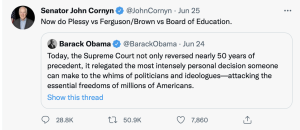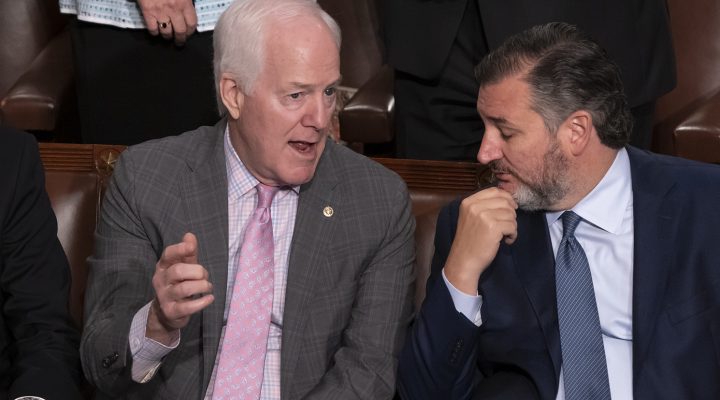The ranking U.S. senator from Texas tweeted a response to former President Barack Obama June 25 that online observers immediately called out as blatantly racist.
Exactly what Sen. John Cornyn meant is not clear, as he has not responded to an avalanche of online critique. He only issued a one-sentence tweet in response that neither confirmed nor denied accusations that his first tweet was overtly racist.
 On Friday, June 24, after the U.S. Supreme Court broke precedent and overruled what justices had sworn was “settled law” in the 1973 decision Roe v. Wade, Obama tweeted: “Today, the Supreme Court not only reversed nearly 50 years of precedent, it relegated the most intensely personal decision someone can make to the whims of politicians and ideologues — attacking the essential freedoms of millions of Americans.”
On Friday, June 24, after the U.S. Supreme Court broke precedent and overruled what justices had sworn was “settled law” in the 1973 decision Roe v. Wade, Obama tweeted: “Today, the Supreme Court not only reversed nearly 50 years of precedent, it relegated the most intensely personal decision someone can make to the whims of politicians and ideologues — attacking the essential freedoms of millions of Americans.”
To which Cornyn the next day replied: “Now do Plessy vs Ferguson/Brown vs Board of Education.”
Plessy v. Ferguson was a landmark 1896 decision of the Supreme Court that said racial segregation laws did not violate the Fourteenth Amendment to the U.S. Constitution as long as facilities for each race were equal in quality, a idea that came to be known as “separate but equal.”
That was an 8-1 vote, with Justice Henry Billings Brown writing in the majority opinion: “The object of the (Fourteenth) amendment was undoubtedly to enforce the equality of the two races before the law, but in the nature of things it could not have been intended to abolish distinctions based upon color, or to endorse social, as distinguished from political, equality. … If one race be inferior to the other socially, the Constitution of the United States cannot put them upon the same plane.”
That 1896 ruling was partially overturned by the Supreme Court in its 1954 decision Brown v. Board of Education, which found state laws establishing racial segregation in public schools unconstitutional, even if the segregated schools are otherwise “equal” in quality. This ruling eventually led to integration of public schools, which set off a chain reaction from white supremacists and evangelical Christians across the South.
“Now do Plessy vs Ferguson/Brown vs Board of Education” as tweeted by Cornyn was perceived as a demand that the high court go further than it did in last week’s abortion decision — an interpretation aided by the fact that Justice Clarence Thomas explicitly called for the court to undo previous rulings that decriminalized same-sex relations, made same-sex marriage possible and made contraception widely available.
Despite a barrage of questions and criticism, Cornyn only offered a brief second tweet: “Thank goodness some SCOTUS precedents are overruled.”
Did that mean he agreed with the Supreme Court partially overruling Plessy in the Brown decision? If so, why did the original tweet said, “Now do …”?
Just one week before, Cornyn had been booed by delegates to the Texas Republican Party annual gathering because of their objections to him working on a bare-minimum bill addressing gun violence.
Just one week before, Cornyn had been booed by delegates to the Texas Republican Party annual gathering because of their objections to him working on a bare-minimum bill addressing gun violence. That bill was passed by both houses of Congress last week and signed into law the very day of Cornyn’s odd tweet.
Cornyn’s treatment at the Texas GOP event was shocking to more moderate Republicans who have revered the Texas senator as a more reasonable counterpart to the state’s junior senator, Ted Cruz.
The two tweets left even some Cornyn supporters scratching their heads in wonderment. But to his critics, the message was clear: This was a racist dog whistle to the far right embodied in the modern Texas Republican Party but one so oblique as to be deniable to those outside the fold.
Cornyn is a San Antonio native who served nearly four decades in Texas as a district judge, a member of the Texas Supreme Court, and as state attorney general. He was elected Texas attorney general in 1997, becoming the first Republican to hold that office since Reconstruction. Five years later, he was elected to the U.S. Senate.
Cornyn previously was a longtime member of University Avenue Church of Christ in Austin for many years. His current religious affiliation is listed meredly as nondenominational Protestant.
Related articles:


